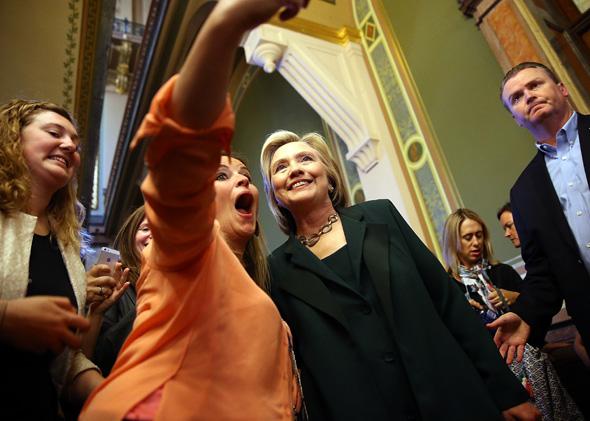New information about donations to Hillary Clinton’s family foundation and her husband have her on the defensive. It’s also going to make it harder to go on offense.
When Clinton announced her campaign, she outlined four big fights she would take on. One of the pillars of her pitch was that she wanted to fix “our dysfunctional political system and get unaccountable money out of it once and for all, even if that takes a constitutional amendment.”
This position has political appeal. Voters think the system is rigged, and they think big money helps those in power keep it rigged. For a populist campaign of the kind Clinton wants to run, it would be helpful to run against Republican operations where the donors are hidden and where mountains of money pour in against her.
One of the big questions in politics is just how much big money donations compromise the people who receive them. No matter how noble the cause or how good a speaker you are, when someone writes a check with a string of zeros, there’s a chance he wants something in return beyond your good works and inspirational message. That’s certainly what Democrats, including Bill Clinton, have suggested about the vast amounts of cash that go to conservative candidates.
It just stands to reason. And now Republicans are saying the same thing about Hillary Clinton.
One way to answer this question is to have the process be transparent so everyone can all see if huge donations shape policy or increase the attention a politician pays to a particular policy—either publicly or privately.
The Clinton team will make the distinction that they were transparent when it came to donations made to the Clinton Foundation. But the Clinton Foundation disclosure is limited, and in some cases it wasn’t done at all, according to the New York Times:
As the Russians gradually assumed control of Uranium One in three separate transactions from 2009 to 2013, Canadian records show, a flow of cash made its way to the Clinton Foundation. Uranium One’s chairman used his family foundation to make four donations totaling $2.35 million. Those contributions were not publicly disclosed by the Clintons, despite an agreement Mrs. Clinton had struck with the Obama White House to publicly identify all donors. Other people with ties to the company made donations as well.
The question of transparency has nothing to do with whether money was given in return for favorable action by the State Department. The question is whether the rules that were in place were followed. “This failure,” says the New York Times editorial page, “is an inexcusable violation of her pledge.” When you don’t follow the rules in one place, you might not follow them in another. Say, in your email practices, for example.
How much do voters care about transparency? It’s not yet clear. But Clinton is now accumulating transparency challenges in her portfolio, the first being her private email system that operated outside of State Department rules. That would seem to make it harder for her to attack Republicans for their relationship with donors who don’t want people to know who they are or who otherwise use aggressive interpretations of the rules to get their own way.
This campaign finance pillar of the Clinton campaign appears to be weakened already, but some campaign finance advocates were skeptical that Clinton was ever going to have a big fight over campaign finance reform as she pledged, seeing the policy gambit as a way to inoculate herself from the questions raised by donations to her family foundation. We’ll see in the coming months if she takes on this cause. She’s got to get off defense first.
Read more of Slate’s coverage of Hillary Clinton and the 2016 campaign.
